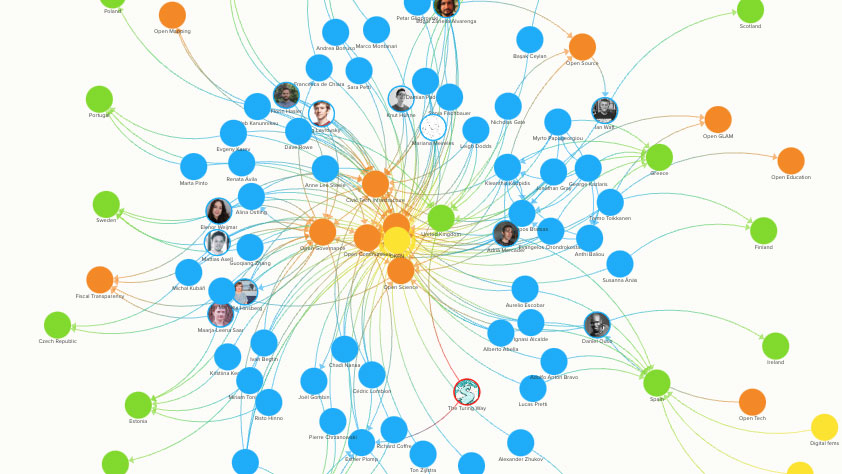
On 10 October 2024 the regional call for Europe for the Open Knowledge Network was held online. The discussion was facilitated by Esther Plomp, the Regional Coordinator for Europe.
Objectives and context of the meeting
The Europe regional call aimed to understand whether it would be helpful to map the connections between existing OFKN network and chapter members, based on a pilot map created by Esther. Discussions led to the conclusion that instead of mapping the network members – it would be more helpful to map the projects on which they are working on.
Mapping
Esther kicked off the call by presenting the pilot map for the European region with a heavy focus on the OKFN and its individual members. She also shared alternative mappings that have been made available by others in the Open landscape:
- Existing map on scientific disciplines and open science practices by Access 2 Perspectives
- Research institute map by Cassandra Gould van Praag
- Open Scholarly communications map by ASAPBio
- Mapping the open movement by Open Future
- South African DH & CSS Stakeholder Map Project by SaDiLaR
As well as overviews related to Open Knowledge such as:
- Open Science Capacity Building Index by UNESCO
- Organisations in data governance.pdf by the Datasphere Initiative
- EU Common Data by Our Common Data Space
- National stakeholders for open/federated infrastructure by the European Commission
- Open Infrastructure Funding Dashboard by Invest in Open Infrastructure
After a quick review of the pilot map and the available resources, our discussion went into a different direction: It would be more helpful to find synergies between the activities in the different topic areas, rather than mapping individual members. This would result in more focus towards concrete activities geared towards international cooperation. A good way forward would be the working groups that were discussed in the OKFN Gathering in Katowice, such as the ‘Open Knowledge Festival 2025’, a ‘toolkit for regional advocacy’, and the ‘Mentorship programme; for the network. This led to a discussion of the Project Repository as a good example of how the ongoing activities in the network are already mapped.
Project Repository
The Project Repository is an overview of open projects set up by both Network Members and other projects promoting openness developed by organisations that are close allies to the Network. During the Europe regional call it became clear that it would be helpful to continue building on the Project Directory and make it easier for Network Members to find, understand and replicate projects.Ultimately, the Project Repository can support outreach and capacity building: When projects have similar goals the teams can take action together.
Increase awareness
The Project Repository may increase awareness for projects and facilitate people working together on similar goals. The way that the Project Directory is currently set up may not yet facilitate this collaboration, as the Directory is currently underused by the Network members. If the Repository is not widely used amongst network members it is highly unlikely that all their projects are currently listed. The overview may also become outdated if there are no clear mechanisms to update existing projects. To avoid an overflood of information and make it easier to get started, it may be more helpful to list fewer projects that are still active and focus on their progress or replicability for others. There are many benefits to copying existing projects instead of reinventing the wheel. One benefit is that it is easier to get funding for projects if you have a proof of concept. The Project Repository can be especially helpful here.
More information about how successful projects can be replicated
It is currently difficult to determine which projects would be easier to build on for others based on the Project Repository structure. For example, right now both Network projects and external projects are listed in the same colours.
It would be helpful if the Project Repository focused more on projects that could be replicated in other regions. For this, different information is needed than is currently available in the Project Repository. For example:
- What are the requirements to successfully implement the project?
- What are the success factors?
- How can you get started with a small prototype version of the project?
- How can the existing project support other teams that want to replicate the project?
- User stories: how can this project be useful for certain audiences?
- How does this project link with other projects in the Project Repository? Which Network members were involved?
- What is the level of a project? Is it part of a larger (international) initiative?
This may require some restructuring to make it clearer what projects are active and which ones are easier to replicate. Additionally it may be easier to find relevant projects when they are filtered on the problems that they aim to address. The possibility of using the Project Repository as an incubator space was also raised.
Share success stories
One example highlighted by the Switzerland chapter was the Prototype fund, where Switzerland learned from the German experiences. Both teams will co-present their collaboration to inspire others in the next OKFN network call!
Next Steps
To improve the awareness for the Project Repository the next Open Knowledge Foundation Network call on the 26th of November will focus on this topic.
To move us into action, Esther will kick off the working group on the Mentoring Programme. In the future it will be important to track the progress of these different working groups: what is moving forward and where are we moving?








